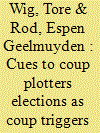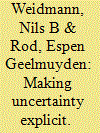| Srl | Item |
| 1 |
ID:
147312


|
|
|
|
|
| Summary/Abstract |
A large proportion of coup attempts in autocracies occur in the aftermath of elections, yet little systematic research exists on the topic. Drawing on recent literature on elections in autocracies, we present an argument to explain postelection coups. While we recognize that electoral institutions have the potential to stabilize autocracies, we illustrate that the election event can spark instability when incumbents reveal electoral weakness. Electoral outcomes—in the form of vote shares and opposition reactions—are signals containing information about the strength of the opposition, and indirectly about the likelihood of a successful full-scale revolution that would compromise the privileged positions of regime elites. In these situations, coups are likely to be initiated to avoid a revolution, either by serving as concessions to the opposition or by facilitating increased repression. We perform a large-N study that supports our argument, significantly nuancing the claim that elections stabilize autocracies.
|
|
|
|
|
|
|
|
|
|
|
|
|
|
|
|
| 2 |
ID:
137034


|
|
|
|
|
| Summary/Abstract |
When coding events from media sources – as the majority of data projects do – different reports may oftentimes contain contradictory information. What do coders make of this? It is up to them to aggregate different reports into one coded event, and to supplement missing information based on other sources or their own background information. If not addressed properly, this may lead to a lack of replicability and to low reliability of the final data product. In this short article, we present an approach for separating (i) event reports and the information contained in them, and (ii) events, which are based on aggregate information from the reports and constitute the final data product. Our procedure preserves uncertainty arising from multiple reports and gives the user control over how missing and conflicting information should be dealt with. We illustrate our procedure with data from a current coding project, the Mass Mobilization in Autocracies Database (MMAD).
|
|
|
|
|
|
|
|
|
|
|
|
|
|
|
|